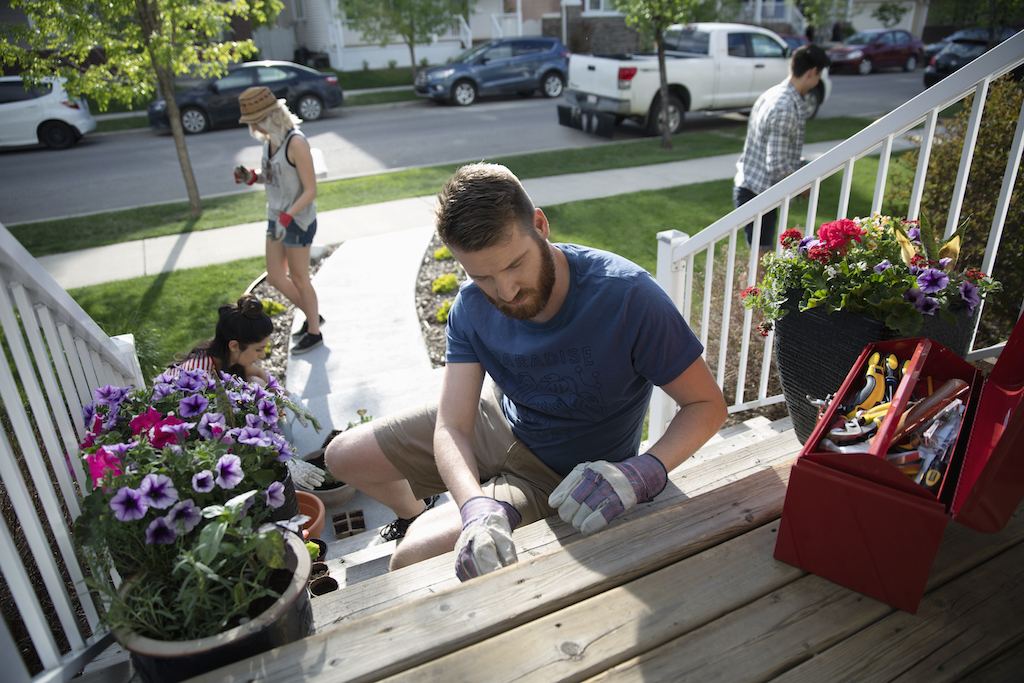As real estate prices remain high, it’s becoming increasingly difficult for first-time buyers to break into the market, especially single people relying on a single income. One solution gaining traction is by joining forces with a friend or family member, essentially doubling each person’s purchasing power by co-owning a home. Before diving into such an arrangement, however, it’s important to know the pros and cons of buying property with friends.

Do: Have an Ownership “Prenup”
When purchasing a home with a friend, you’re not just buying property together: you’re entering into a business agreement that could have significant implications down the road. That’s why it’s important to put together a legal agreement – similar to a marital prenuptial agreement – outlining such things as ownership percentage, division of expenses and addressing the possibility of big life changes down the road. Planning for every contingency at the outset will prevent unpleasant surprises down the road.
Related: This is the Income Required to Own a Home in Canada’s 13 Hottest Real Estate Markets

Don’t: Jump Into a Purchase and “Figure Things Out Later”
You and your friend (or sibling or cousin or parent) may have a rock-solid relationship and deep trust in each other, but changing circumstances can always lead to conflicts that could wreck the friendship. The worst thing that can be done when two people decide to buy a home together is to jump in headfirst without putting an agreement in writing. Buying a home and then promising to figure out the rest after the fact is a recipe for disaster.
Related: Scott McGillivray Shares 8 Tips to Help You Deal with a Lousy Landlord

Do: Share Credit Scores
It’s key that each person in the homebuying partnership reveals their credit score to the other. Because the mortgage rate for the home purchase will be tied to the credit reports of both parties, if one person has a high score and the other a low one, that could negatively impact the rate to the detriment of one of the partners.
Related: These Are the Houses You Can Get on a $300K Budget Across Canada

Don’t: Avoid Talking About Financial History
How much do you know about your friend’s finances? Have they ever filed for bankruptcy? How much debt is the person carrying? How much savings do they have? Will their portion of the mortgage payments be feasible on an ongoing basis? These may seem like invasive questions for those raised to believe that discussing money reflects poor manners, but these are all important questions that need to be answered before purchasing a home together.
Related: Buying an Older Home? Watch Out for These Red Flags

Do: Determine Shared Responsibilities
Who will pay the bills and will it be a 50/50 split? What about unforeseen expenses (i.e. plumbing, pest control) and ongoing maintenance (will one person agree to clean the gutters, while the other promises to mow the lawn or will these duties be shared equally?) What about repairs and renovations? All these issues should be discussed from the get-go to ensure everyone is on the same page and one person doesn’t feel that he or she is doing all the work while the other one is getting a free ride, a scenario that is guaranteed to result in resentment.

Don’t: Proceed Without an Exit Strategy
Stuff happens. As the years go by, we can all expect changes in our lives, such as new romantic relationships and possibly marriage, which could result in one person wanting to exit the partnership and sell the home. Because both names will be on the mortgage, if one person wants to exit, this will require either selling the home of refinancing the mortgage under just one person’s name – both of which can be a challenge. Other issues that should be addressed: the possibility of one person dying.
Related: Reddit User Reveals the Truth About Buying Your First House in Viral Post

Do: Maintain a Fund for Home Repairs
As any homeowner well knows, unexpected expenses will inevitably pop up when repairs are required. That’s why it’s crucial to know up front how these costs will be paid and where the money will come from. An excellent idea is to open a joint bank account where each partner will put aside money on a regular basis in order to accumulate a fund to deal with these unforeseen costs, ensuring money is available when it’s needed.

Don’t: Assume You’ll Cohabitate Well
It’s important to remember that not only will you be co-owners, you’ll also be living together, which can lead to conflict and strife if your personalities don’t mesh as expected. One way to ensure this doesn’t become an issue down the road is to try renting a place together first and see how things go. If it becomes clear that you aren’t suited to live together, it’s far less complicated to end a rental agreement than to sort out how to exit a joint mortgage.
Related: The Most Common Deal Breakers for Homebuyers Revealed

Do: Lay Down House Rules
If we learned anything from TV’s The Odd Couple, it’s that different styles of living can create conflict, say if one person’s tidy and the other is a slob. This also expands into other areas: does one person enjoy loud music while the other prefers silence? What about having friends over? Parties and entertaining? Who has access to the home? It’s key to lay down some rules that all parties agree on.

Don’t: Be Ambiguous in the Home Search
All parties need to be crystal clear on what they’re looking for in a home, everything from its location to size to amenities (i.e. deck, garden, swimming pool, etc.). Everyone needs to be on the same page or the process of looking for a home will become a chaotic waste of time if conflicts aren’t addressed and concessions aren’t made so that a home can be found that suits the needs of everyone involved.
Related: 7 Questions You Need to Ask Your Real Estate Agent Before Buying
HGTV your inbox.
By clicking "SIGN UP” you agree to receive emails from HGTV and accept Corus' Terms of Use and Corus' Privacy Policy.




